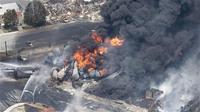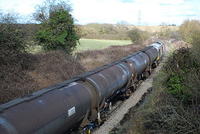-
Growing scrutiny of police use of Stingray surveillance technology
IMSI-catcher (International Mobile Subscriber Identity), aka Stingray, is a surveillance technology which simulates cell phone towers in order to intercept mobile phone calls and text messages. Privacy advocates have scrutinized the use of Stingrays in U.S. cities because, when the device tracks a suspect’s cell phone, it also gathers information about the phones of bystanders within the target range. Additionally, police use Stingrays without properly identifying the technology when requesting search warrants has raised concerns.
-
-
Social media firms pledging to keep users anonymous still collect users’ information
Social media firm Whisperprides itself on offering anonymity in a market where the biggest players are often considered too transparent. Its co-founder, Michael Heyward, a tech entrepreneur, describes the company as “the first completely anonymous social network,” an alternative to Facebookand Twitter. It now emerges that Whisper’s back-end systems that retain digital libraries of texts and photographs sent by users, and in some cases the location information of users.
-
-
Sale of NYC historic Waldorf Astoria hotel to Chinese firm worries U.S. security officials
Citing an espionage risk, U.S. officials are expressing concern over the sale of the historic Waldorf Astoria hotel in New York City to a Chinese insurance company. The Beijing-based Anbang Insurance Group purchased the property from Hilton Worldwide on 6 October for $1.95 billion. One clause in the sale contract, referring to “a major renovation,” has raised eye brows in Western security services. Specifically, they worry that renovations and modifications to the structure could accommodate Chinese eavesdropping and cyber espionage equipment.
-
-
Debate continues over releasing Pennsylvania crude oil shipment information
Shipment of crude oil by rail in the United States has increased from 800,000 barrels a day in 2012 to 1.4 million in 2014. In western Pennsylvania, over seventy-five million gallons of crude oil are passing through Allegheny and Westmoreland counties to refineries in Philadelphia. Release of the recently classified rail transport records by Pennsylvania Emergency Management Agency (PEMA) was a result of a federal mandate ordering railway companies to share information on interstate shipments of crude oil with state emergency management officials.Railway companies claim that releasing the information threatens security and is commercially sensitive.
-
-
Background-checks company lays off 2,500 after losing government contracts
USISof Falls Church, Virginia has laid off more than 2,500 employees after it lost contracts with the Office of Personnel Management(OPM) and DHS. Until recently, USIS performed many of the background checks for federal security clearances, but after the firm suffered a cyberattack in August, OPM decided not to renew two major contracts which expired on 30 September 2014.
-
-
Securiport’s advanced biometric immigration control systems help in fight against Ebola
Securiport says it is supporting the fight against the Ebola virus in West Africa by providing advanced biometric screening technologies and comprehensive contact tracing data analytics to help governments and health organizations monitor and control the spread of the virus. The company’s immigration control systems are now in place across a total of seven West African nations, including Sierra Leone, Senegal, and Ivory Coast.
-
-
Petroleum industry, railroads want deadline extension for phasing out old tank cars

Transportation of crude oil by train jumped to 408,000 in 2013, from 11,000 in 2009, partly due to the rise in production from North Dakota’s Bakken region, where oil production has surpassed pipeline capacity. The increasing use of rail to transport crude oil has resulted in several accidents. The Department of Transportation want to phase out older tank cars — because they have thinner shells and are thus more vulnerable to accidents when transporting flammable liquids like crude oil – and replace them with new, safer tank cars with thicker shells. The petroleum industry and U.S. railroads want DOT to extend the deadline for phasing out old tankers from two years to four years.
-
-
CDC: First Ebola case diagnosed outside Africa; patient being treated in Dallas, Texas
The Center for Disease Control and Prevention (CDC) yesterday evening announced the first case of Ebola to be diagnosed outside Africa during the current outbreak, which has so far killed more than 3,000 people this year. The CDC said the patient left Liberia on 19 September, but did not develop symptoms until 24 September, when he was already in Dallas. He was admitted to the Texas Health Presbyterian hospital in Dallas on Sunday, 27 September. The possibility of treating the patient with experimental therapies was being discussed with the patient’s family. If the Texas patient receives the experimental treatment for Ebola, he will be the fifth to do so in the United States (a sixth American – a carrier of dual American-Liberian citizenship who worked for Liberia’s Ministry of the Treasury – contracted the disease in Monrovia in July and dies a few days later in a Lagos, Nigeria hospital). The FDA has issued warning letters to three privately held companies marketing what they claim are treatments to prevent or treat Ebola.
-
-
$3 million in grants for three pilot projects to improve online security, privacy
The National Institute of Standards and Technology (NIST) the other day announced nearly $3 million in grants that will support projects for online identity protection to improve privacy, security and convenience. The three recipients of the National Strategy for Trusted Identities in Cyberspace (NSTIC) grants will pilot solutions that make it easier to use mobile devices instead of passwords for online authentication, minimize loss from fraud and improve access to state services.
-
-
A first: Jury finds bank guilty of financing terrorism
In a major development on the terrorism financing front, a U.S. jury found Arab Bank Plc liable for providing material support to Hamas and ordered the bank to compensate nearly 300 Americans who are either victims or relatives of victims of at least two dozen attacks tied to Hamas in Israel and the Palestinian territories.
-
-
West Virginia mulls releasing crude oil shipment information to the public

In May 2014, the U.S. Department of Transportation(DOT) ordered railroads operating trains carrying more than one million gallons of Bakken crude oil to notify state emergency officials in states through which oil-carrying trains travel of the expected movement of such trains. The order came to allow first responders to be better prepared should an accident occur. CSX Corporation agreed to share shipping information with West Virginia officials, but refused to release the information to the public citing concerns about terrorism. DOT made it clear that citing terrorism concerns does not exempt crude oil shipment information from being released to the public.
-
-
Day of commercially available quantum encryption nears
If implemented on a wide scale, quantum key distribution technology could ensure truly secure commerce, banking, communications, and data transfer. Los Alamos National Laboratory signs the largest information technology agreement in the lab’s history which aims to bring quantum encryption to the marketplace after nearly twenty years of development at the national-security science laboratory.
-
-
Start-ups offer apps which help people cope with disasters
Open data policies which allow government agencies to share public information with citizens and the private sector have made California welcoming to startups dedicated to helping communities recover following a disaster.For example: Appallicious offers an app which allows subscribed cities and towns to select from hundreds of data sets, then share with the public, information on evacuation routes, current hazards, and location of critical resources.BlueLine Grid allows public employees from different agencies to communicate with each other during a crisis.SeeClickFix is connecting residents to their local government.
-
-
Johnson & Johnson accelerates Ebola vaccine program
Johnson & Johnson last week announced it will fast-track the development of a promising new combination vaccine regimen against Ebola and collaborate with its partners to address the current Ebola outbreak. The accelerated vaccine program features a prime-boost regimen, in which one vector is used to prime and the other to boost the immune response. It consists of two vaccine components that are based on AdVac technology from Crucell N.V.(part of the Janssen pharmaceutical companies of Johnson & Johnson, based in the Netherlands) and the MVA-BN technology from Bavarian Nordic (a biotech company, based in Denmark).
-
-
HHS awards $24.9 million contract to accelerate development of Ebola drug

The development of a medication to treat illness from Ebola will be accelerated under a contract with the U.S. Department of Health and Human Services’ Office of the Assistant Secretary for Preparedness and Response (ASPR). HHS says that this contract supports the government-wide response to the Ebola outbreak in West Africa. The $24.9 million, 18-month contract with Mapp Biopharmaceutical Inc., of San Diego, California, may be extended up to a total of $42.3 million. HHS notes that it is seeking additional proposals for the advanced development of antibody treatments, antiviral drugs, and vaccines against the Ebola and Marburg viruses.
-
- All
- Regional
- Water
- Biometrics
- Borders/Immig
- Business
- Cybersecurity
- Detection
- Disasters
- Government
- Infrastructure
- International
- Public health
- Public Safety
- Communication interoperabillity
- Emergency services
- Emergency medical services
- Fire
- First response
- IEDs
- Law Enforcement
- Law Enforcement Technology
- Military technology
- Nonlethal weapons
- Nuclear weapons
- Personal protection equipment
- Police
- Notification /alert systems
- Situational awareness
- Weapons systems
- Sci-Tech
- Sector Reports
- Surveillance
- Transportation
Advertising & Marketing: advertise@newswirepubs.com
Editorial: editor@newswirepubs.com
General: info@newswirepubs.com
2010-2011 © News Wire Publications, LLC News Wire Publications, LLC
220 Old Country Road | Suite 200 | Mineola | New York | 11501
Permissions and Policies
Editorial: editor@newswirepubs.com
General: info@newswirepubs.com
2010-2011 © News Wire Publications, LLC News Wire Publications, LLC
220 Old Country Road | Suite 200 | Mineola | New York | 11501
Permissions and Policies
